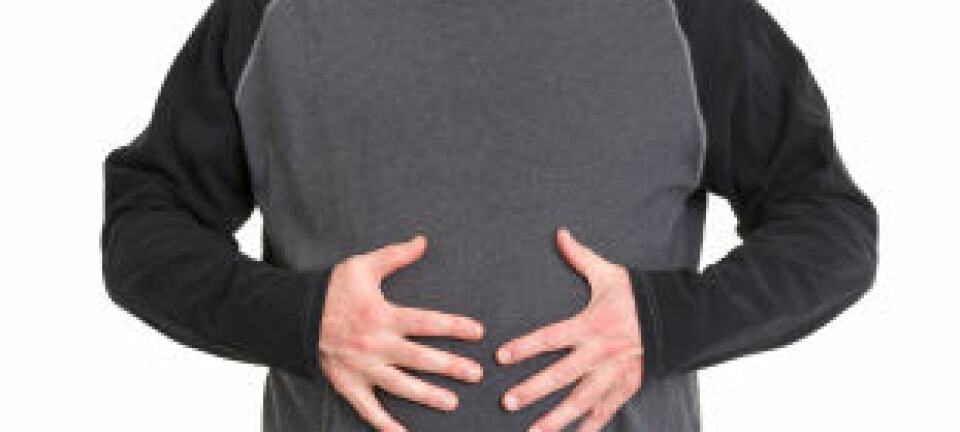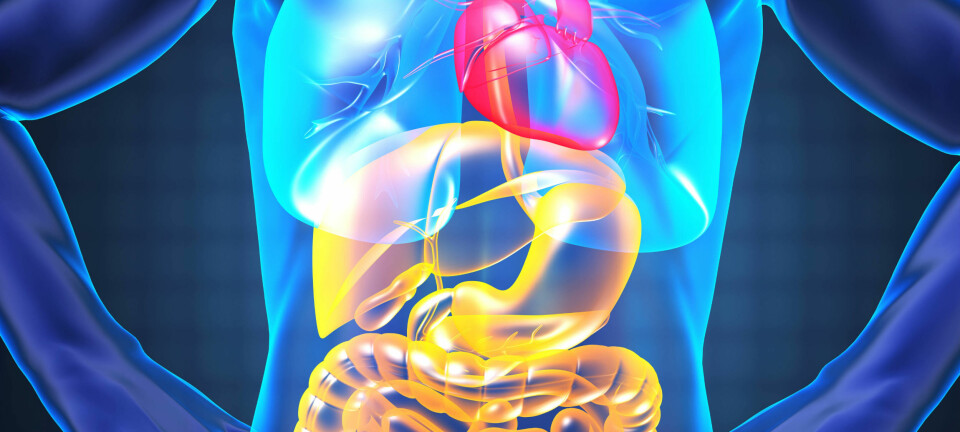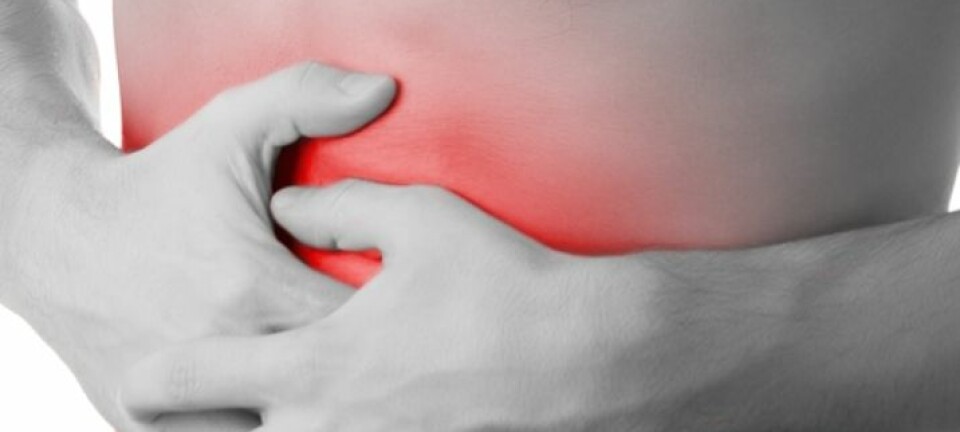
First image of an irritable bowel
Just a few years ago many in the medical profession thought that the common intestinal malady irritable bowel syndrome (IBS) was psychological – with its origins in the head, not the gut. But Norwegian medical researchers have shown that the intestines of IBS patients do react to food in a special way.
Denne artikkelen er over ti år gammel og kan inneholde utdatert informasjon.
An irritable bowel is not dangerous. Just very, very irritating. Those who have it continually deal with intestinal pain, gas, diarrhoea or constipation. For some, these problems severely reduce the quality of their life.
But there are no diagnostic tests as yet that can actually detect IBS. Doctors make their diagnosis based on symptoms described by patients and when they find no other intestinal disorders that could explain the problems. Remedies or good explanations for cantankerous colons are hard to come by.
However, some patients have their own theories: Many tell their physicians that various types of food make them worse. Yet tests for allergies and food intolerance often yield negative results – nobody finds any tangible cause.
Until quite recently, IBS was thought to be triggered by mental troubles. This is not as odd as it might sound – studies have shown that a significant number of IBS patients suffer from anxiety or depression.
But if you ask Radiologist Ragnhild Undseth of Lovisenberg Hospital in Oslo whether the problem starts between the ears, her answer is emphatic.
“No," she says. "This is not psychological.”
Undseth used magnetic resonance imaging (MRI) to compare IBS patients and healthy individuals, and has now taken the first pictures that show a difference in the intestines of the two groups.
Artificial sugar and pictures
The purpose of the study was to see if the intestines of people with IBS reacted abnormally in reaction to certain carbohydrates that are hard for the small intestine to absorb. These are called FODMAPs and the substances are found in many common foods.
Research over the last few years has suggested that many IBS patients have a lot to gain by avoiding these substances. But why?
Undseth and her colleagues at Lovisenberg Hospital and the University of Oslo had 52 IBS patients and 16 healthy individuals each consume ten grams of lactulose, an artificial and non-digestible sugar – a typical FODMAP. One hour later the participants’ intestines were viewed with an MRI machine.
It turned out that the IBS patients on average had much more fluid in their small intestines – small bowel water content – than the healthy subjects.
“This is the first time anyone has taken pictures showing that IBS patients and healthy people react differently to food,” says Undseth.
Disturbed bowel movement
There are two explanations as to why IBS patients appear to have more liquid in their small intestines, says Jørgen Valeur, one of the other researchers involved in the study.
“It’s possible that their intestines secrete more fluid. But I’m more inclined to think their small intestines are less capable of emptying into the large intestine,” he says.
“We also saw signs of a type of disturbance in the motor function of the intestines. This could explain why there is a concentration of fluid in the small intestine.”
Valeur wonders whether the neurotransmitter serotonin could be playing a role in this process. It stimulates movement in the digestive tract and previous findings have shown that IBS patients have less serotonin and fewer serotonin-releasing cells in the small intestine than healthy people.
This is particularly intriguing because serotonin is a substance that really affects the brain. We know that low levels of it can cause depression and anxiety, which are the mental afflictions that are common amongst IBS patients.
Maybe a lack of serotonin causes hypersensitivity in the bowels as well as the brain?
“But this issue of serotonin and IBS is extremely complicated,” cautions Valeur.
Serotonin can have highly different effects depending on which receptors it encounters in the body. This is much more than a matter of too little or too much. Not enough is known yet to say anything definitive about the role the substance might play in IBS.
Important contribution
Professor Per G. Farup of the Norwegian University of Science and Technology was not involved in this study but has worked IBS patients for years. He is not convinced that a serotonin deficiency is behind an accumulation of liquid in the gut, in part because serotonin measurements vary so much within sub-groups of IBS patients.
But he still thinks Undseth’s results are intriguing.
“This is an important contribution in the discussion about the causes of IBS. The research shows that this is an organic disorder in which patients really react to FODMAP substances,” he says.
Farup has seen that many of his own patients claim to be better off when they reduce FODMAPs in their diets. But this doesn’t work for all of them. Nonetheless, this too could jibe with the results of the new study.
Even though the IBS group on average had more small intestine water content after swallowing lactulose, there was a wide variation between individual patients. Some accumulated a large amount of fluid, while others had no more than the healthy members in the control group.
“The term FODMAP includes many different substances. Most likely, not all IBS patients react equally to all FODMAPs,” says Farup.
Symptoms did not fit
Farup points to another characteristic of the results.
As part of the study, both patients and the healthy control individuals evaluated whether they felt any discomfort after eating the lactulose. Many more IBS patients than healthy individuals reported pains and feeling bloated and gaseous. But the degrees of these symptoms did not seem to correlate with the quantity of fluid they had in the small intestine.
Farup says this could be because the study involved too few patients for a pattern to emerge.
On the other hand, it could also mean that lactulose has a number of different effects on the gastrointestinal tracts of IBS patients, and the unpleasant symptoms are caused by something other than such an accumulation of fluid.
Valeur suggests a similar hypothesis.
“We were rather disappointed about not finding a link. But it’s possible that the symptoms can be attributed to things that occur after the fluid eventually flows over to the large intestine,” he says.
Indeed, the researchers have seen signs that the activity of large intestine in IBS patients differs from that in healthy individuals.
Not a test for IBS
The results of the Norwegian MRI study have given scientists some new angles to work from. But lots of work remains to be done before science really understands why some people don’t tolerate substances in ordinary foods.
The new findings are primarily a step along the road toward more understanding and currently have no impact on patient care.
“If you were to ask whether all IBS patients can come and get their diagnosis confirmed by an MRI, the answer is no,” says Undseth.
Variations among patients are probably too great for an MRI to give a reliable diagnosis.
“But the technique can be useful for research, both for discovering more about IBS and when evaluating whether new types of treatment work,” says Undseth.
------------
Read the Norwegian version of this article at forskning.no
Translated by: Glenn Ostling



































